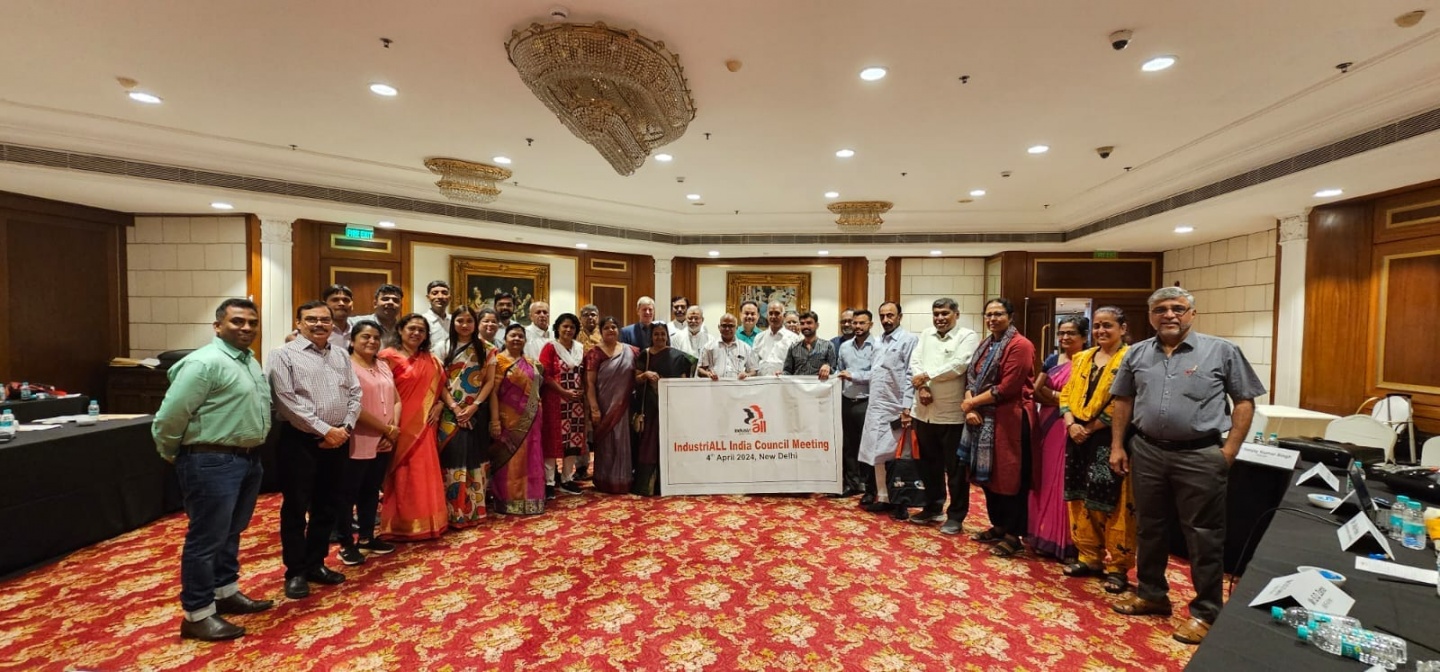9 April, 2024IndustriALL Global Union’s general secretary Atle Høie’s recent visit to Delhi comes ahead of the upcoming general election in the country where trade unions are campaigning against the ruling party’s anti-worker policies.
In a strategic discussion on occupational safety and health on 3 April, Indian affiliates stated that industrial safety in the country is in shambles. According to the Directorate General Factory Advice and Labour Insitutes, since 2021, every year, there have been at least 1,029 accidents, resulting in the death of over 1,000 workers and causing serious injuries to more than 3,000 others. Work-related injuries and illnesses remain largely undocumented, particularly as victims are predominantly precarious workers.
Unions in India are raising their voices against the rise in contractual or precarious work forms, which entail greater health and safety risks. There is a pressing need to organize precarious workers.
Gautam Mody, IndustriALL executive committee member and convenor of Unions United, said:
“85 per cent of workers in India’s manufacturing are in precarious employment. Bringing precarious workers into the union fold is the centre piece of building power and our greatest challenge. Unity of strategy and purpose is central to defending workers right."
Affiliates also highlighted the constant neglect of occupational diseases and hazards; amendments to labour laws have further jeopardized workplace safety.
S Q Zama, IndustriALL executive committee member and secretary general of Indian National Mineworker’s federation (INMF-INTUC), said:
“IndustriALL and its Indian affiliates have persistently voiced concerns regarding health and safety since the Covid-19 pandemic. The government of India mustn’t compromise on safety and should immediately ratifiy ILO conventions on health and safety, including C155, C183 and C176, and ensure that India complies with ILO C81 on labour inspection.”
But amid the horrors of rising workplace incidents, there are also examples of significant union wins. As a result of the relentless struggle by IndustriALL and affiliates, the Hong Kong Convention is set to enter into force in 2025.
In the IndustriALL’s India council meeting on 4 April, affiliates highlighted their struggles to build union power. Some of the actions shared include attempts to organize white-collar workers in a Siemens’ factory, 2,700 workers regularized in Tata Motors, the struggle against using precarious workers and trainees in public sector coal mines, the mapping of how climate change affects women workers in the downstream shipbreaking industry, and a significant win for precarious workers in the steel industry.
Union leaders stressed that going forward, issues related to Just Transition, due diligence, occupational safety and health including gender-based violence and harassment, precarious work, and core labour standards must be prioritized.
Said Atle Høie, IndustriALL general secretary:
“Ahead of IndustriALL’s Congress in 2025, we need to review our action plan and make sure that our priorities are clear. It’s clear from the discussion that we need to advance our struggle for the inclusion of precarious workers in our unions, along with more women and youth. We must truly make our unions more inclusive. We also need to treat workplace accidents with absolute zero tolerance. It’s shameful that workers’ lives are treated as worthless.”
During a workshop on gender-based violence and harassment (GBVH) in the workplace, women leaders discussed risk factors that contribute to GBVH, as well as measures to prevent GBVH, both at the workplace and within union spaces. An action plan, including raising awareness, assessing the effectiveness of internal complaints’ committee in factories, organizing health camps with a focus on GBVH, developing gender policy within unions, and increasing women’s representation in various committees, was drawn up. They also decided to revive the India women’s committee and develop its Terms of Reference.





